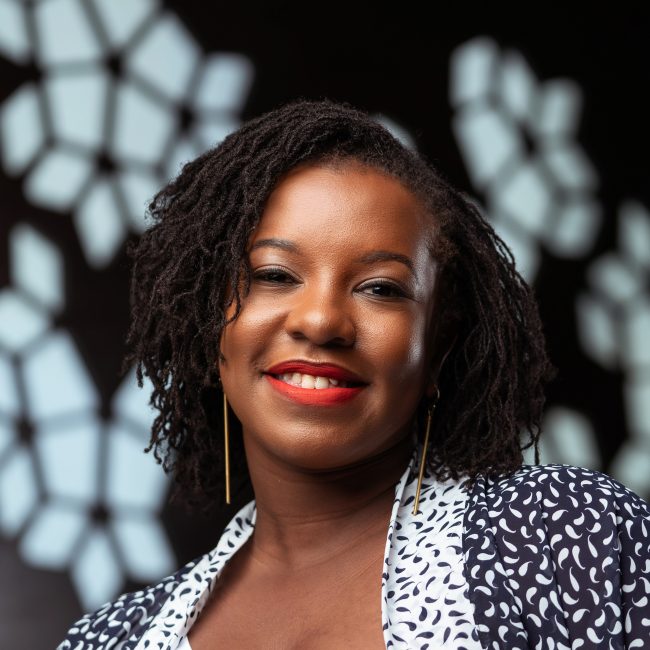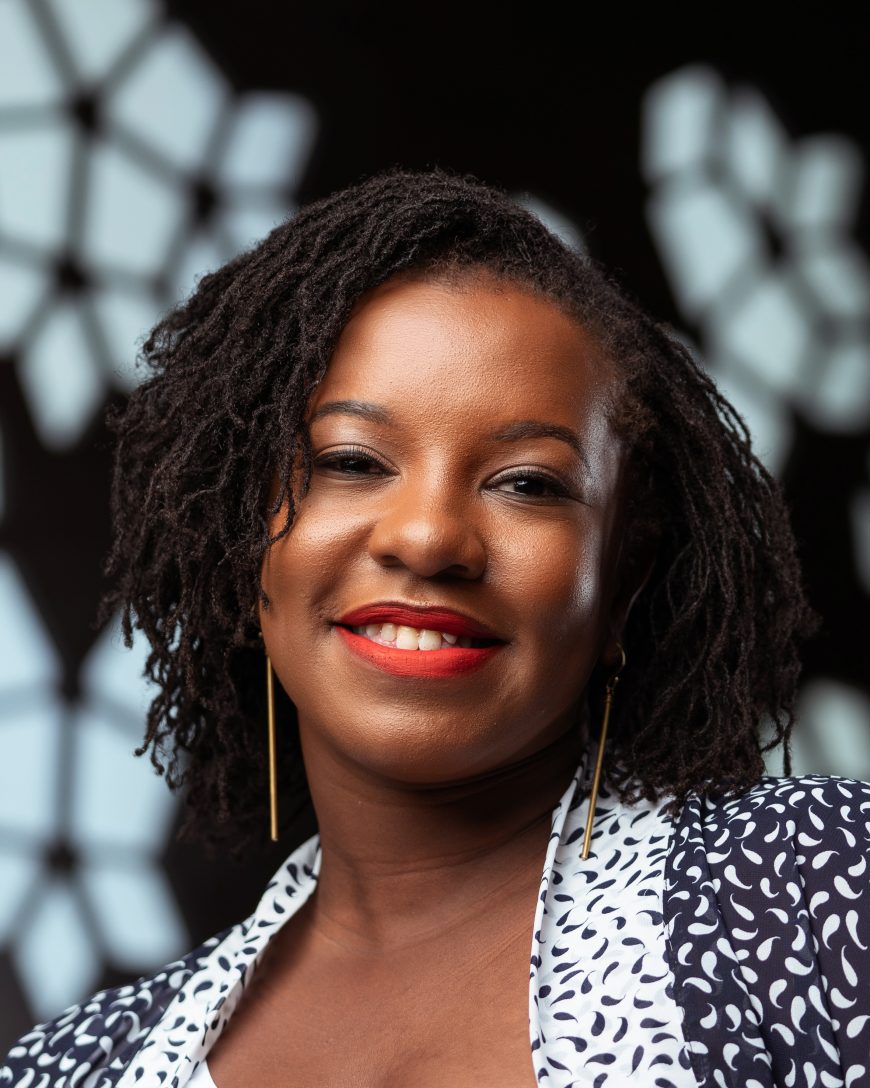Curated conversations with data science for social impact leaders on their career journeys
Pathways to Impact is a series of conversations with data for social impact leaders exploring their career journeys. Perry Hewitt, CMPO of data.org, spoke with Leonida (Leo) Mutuku, founder of Intelipro, an African company building financial management and analytics tools that enable entrepreneurs to make sustainable and profitable decisions for their businesses; and talks about her journey from curiosity in data to working with national governments to advance their data practice.
How did you begin working with data? How did you begin to think about the social applications of data?
When I left university after my undergraduate degree, I started working with iHub Nairobi, a local innovation hub affiliated with Ushahidi. Part of my work there was to support research analysis, particularly data that was being collected on the ground. At that point, our mission was to better understand different approaches to technology in Africa and to support entrepreneurs innovating with tech to solve local challenges. Through working at iHub and meeting all these entrepreneurs, I stumbled upon this field of data science and data in general. I was fascinated by the many ways you can utilize one dataset and the various applications.
That initial exposure piqued my curiosity, and the timing was great—it was around then that Kenya launched an open data initiative. This was among the first open government portals sharing different public data sets on the continent and was inspired by the open government movement championed by former U.S. President Barack Obama; and there was momentum, as around the world, governments and civil society were starting to explore how open data could accelerate development and support transparency and accountability initiatives.
Being involved in that momentum quickly expanded my interest in data science and how open data and ways to access public data sets could be used to promote social change.
Can you share the problems you are trying to solve with data today? We’d love to hear about both your day job as CEO as well as your board role.
After I started working with entrepreneurs within the iHub as well as international organizations such as the World Bank and IDRC, I realized that the impact I was having at iHub was limited to certain kinds of funders and engagements. Meanwhile, there was a growing conversation that there were too few people who were utilizing data effectively. There was a lot of hype around that time: open data, big data, blockchain. AI was not as hyped back then, but there was an understanding that data and AI were the direction the world was moving in. It was understood that this data revolution would affect not only banking, pharma, and other for-profit industries but also data-driven policy-making and social impact work.
But the biggest challenge we faced at that moment was the lack of access to talent. There was a dearth of people who were able to sit at this intersection of data and an understanding of the potential societal or business impact.
Leonida (Leo) Mutuku Founder Intelipro
But the biggest challenge we faced at that moment was the lack of access to talent. There was a dearth of people who were able to sit at this intersection of data and an understanding of the potential societal or business impact. I felt I had the capacity to meet this need, so I set up my own company. I started primarily working with the for-profit sector because that is where the most available and most granular data is—but even that data was really underutilized. My aim was to plant foundational seeds of data use for these companies, first in Kenya, then in Africa and across mainly developing regions. I wanted them to see that the data that they had in their organizations was valuable and could help them improve service delivery to their customers.
That’s why I launched Intelipro, which became my day job. Through Intelipro, I supported the creation of those foundational teams and projects within these companies to become more data-driven in their approach to financial sustainability and serving their customers. But at the same time, the fire that had been ignited in me working in open government at the iHub was still burning. I wanted to work with policymakers, international organizations, and with entrepreneurs engaged in civil society. At that point, a friend of mine invited me to join the board of the Local Development Research Institute (LDRI). My contribution would be both my networks with funders in this research space and helping them set up their research arm.
So that’s how I got involved with LDRI, and supported their mission of working with governments and public institutions to use data to achieve sustainable development goals. More specifically, we support efforts to alleviate poverty, extreme inequality, and hunger. I appreciated LDRI’s bold mission statement, and the fact that data technology sat at the center of it aligned with my personal passion. Over time, my role has evolved. I still provide research strategy and advisory, but now I also lead their AI practice, which is about two years old. This practice focuses on how we can use AI to improve accountable and inclusive decision-making for citizens, while simultaneously using these innovations to support the broader mission of ending poverty, extreme inequality, and hunger.
Part of the Pathways to Impact series
You’ve described some of the pivots you made, but what were the unexpected blockers to your career entry or progression? What’s blocked you at different points and how have you moved past it?
I always say I’ve been quite privileged. My path has been to follow smart people working on smart ideas and join them. There’s been a lot of serendipity around my career, and I’ve been fortunate to never have to look for a job. That being said, there was one challenging transition when I left my role at iHub to set up my consulting company. We were working on the issues of the moment, and the expectation was that because everyone was excited about these buzzwords of big data, data science, and AI I thought, “I’ll just have customers coming knocking on my door to work with me.” And that, of course, was not the case! I think it took us about a year and a half before we could find solid footing. That required perseverance and an effort to hone our messaging on how we wanted to support these institutions.
There were a couple of reasons for that challenge. One was that it was still too early in the technology adoption/knowledge curve for people investing in these projects. At that time, investing in data science and data initiatives was just not a priority, especially before there were many initial proofs of concepts or pilots. There were examples of how Shopify and Amazon and other large companies were advancing with data, but nothing tangible to show what it meant for local companies. Also, even if you roll out a data initiative, the impact will not be visible and measurable immediately.
These challenges were much the same in open data and nonprofits. We were pushing governments to open up data and there were not yet any tangible results. There are many challenges to using government data, like the need for privacy protection. We’re grateful to pioneering funders like IDRC who have been committed to increasing research in developing regions around data. Over time, we’ve been able to get more funders aligned to support our work.
Part of turning around this blocker was finding a Master’s program in business analytics and big data based in Spain. The program spoke to everything I wanted to do in the private and social sectors: skills to communicate better about the potential of data and increase my technical capacity. That program really propelled my career forward.
I hear you on the challenges around early adoption of data. Was there a specific instance you can point to where you had an early win?
In the beginning, financial services was a huge, huge conversation, in parallel with the opportunity for inclusive financial services. That data was almost readily available, and it was easy to show companies early benefits from using this intelligence to benefit both their customers and themselves. It saved companies’ costs and ultimately drove more revenue, while at the same time, improving access to financial services people. Across the world, that’s been one of the most successful use cases of data.
Similarly, some of the early data work we did with the government was in the contracting space. We supported efforts to make contracts and government tenders open in an effort to reduce corruption, and the benefit was clear. We could see an immediate effect for the government through better quotations—more transparent avenues of procurement with citizens getting better value for money. Contributing to open data initiatives such as open contracts was helpful in cementing our work in the government and social sector; and it laid the groundwork for our later work in food and nutrition security because that foundation, with more support and grant funding, allowed us to better collect data on the ground from smallholder farmers, from agro-vets, dealers of agricultural inputs, and local governments, to promote climate smarter agriculture. In Kenya, it’s not commercial farms but smallholder farmers who feed this country. And when smallholder farmers are food secure, then the rest of the country is food secure as well. Data helped us achieve that.
What community of people or resources bolsters your work? What makes you stronger as a contributor and a leader in data for social impact?
In all the work I do, we find ourselves in a community, and each community differs depending on the work. For instance, in policy work, it’s helpful to be in a community with other civil society organizations working towards the same goal: supporting evidence-based policymaking. We meet up at conferences, or through the open government partnership and co-creation meetings. Through those encounters, we have formed lifelong friendships and I am grateful for that support and shared commitment to impact.
I also actively create space and community for the small businesses that I serve, finding ways for us to share the knowledge we are learning from all the implementation projects we’re doing. I believe these insights are beneficial beyond the one or two companies we actively work with; they can support all businesses to remain sustainable on our continent. At the core of these, I would say are fantastic women—as well as what we refer to as “male champions for women.” Sometimes the word feminist is controversial in our context, and there are men who really support the development of women’s careers.
In both entrepreneurship and social sector work, we form WhatsApp groups to run these communities. Even though they can be big, I find them more personal than participating in open online platforms where sometimes the message gets lost. Not everyone in your community gets to see what you’re saying on those larger platforms. So intimate groups like WhatsApp and Telegram have been critical for my career and growth.
Which specific skills enable your contribution? Beyond your Master’s in business analytics, I’m curious which non-data science skillset surprised you as a superpower.
Research! That includes everything from just Google to rigorous social and qualitative research. I bring an ability to understand context, understanding nuance, and understanding why things are the way they are. This has been helpful for me to interpret my data in settings that are not typical for your standard data scientist.
Secondly, being an entrepreneur, I’ve had to teach myself how to market, how to do sales, and how to speak to a non-technical person to sell products. And that entrepreneurial bent is also useful in my policy work because at the end of the day, we are trying to market our research and its outputs. It forced me to not speak in numbers, degrees, or margins of error, but to speak in a way that matters to my different audiences.
There’s a real risk with developing and running automated systems without humans in the loop who bring diverse perspectives and evaluate potential harms. We need to be thoughtful about the process, to avoid systems some companies and influential parties could push to be adopted without the necessary scaffolding. We need that scaffolding in place to protect human dignity and human rights.
Leonida (Leo) Mutuku Founder Intelipro
What advice do you have for someone new to the field who’s interested in doing data for social impact work?
While this comes from a privileged perspective and might not be applicable advice for everyone, I say, explore your passions. Do as many things as possible and see the one that sticks, the one that you can wake up every morning eager to work on. I tend to tell people this because most of the time, when they come to me, they have a vague idea of “Oh, I want to get into the data space; what Master’s degree should I do?” My response is that if you want this degree or this certificate just to jump careers, I think you need to understand where you want to commit for the next few years of your life. Because if you’re just doing it because of the hype, you’ll probably drop out and flounder in your career.
I also tell people to be a jack of all trades. Try everything. If you’re working in a company, work in all the departments as much as possible, or with as many team members as possible. That experience will help you identify strengths and where you want to put your energy.
What’s the next big thing in data for social impact that you see? Is there a trend you’re seeing that you think will be soon realized?
Based on what we see the industry pushing for, the first thing is chat and chatbots. I don’t love them, but I think ChatGPT has just made it possible for everyone to dream about how chatbots could be used in different ways to engage with citizens, customers, and communities. We’re thinking about interactive voice channels primarily because not everyone is literate. Not everyone in their local language will be able to read—so, we’re thinking about how to translate policies to communities for purposes of public participation. I see governments thinking that way.
The second thing is digital identification and using that to deliver services, in both private sector and government / social sector contexts. I think there’ll be a push to do more unified delivery of services using digital IDs. There’s a huge question around data protection, discrimination, and leaving out marginalized groups because the rollout of digital IDs is not automatic. In many cases it’s voluntary and there are no clear regulations for collecting data around people to form their digital identifications. Are the practices benevolent or malicious? What protections are around that data? I expect to see more countries adopting digital IDs with more private sector activity riding on that, but also potentially more harm for communities if it’s not well regulated as part of service delivery.
There’s a real risk with developing and running automated systems without humans in the loop who bring diverse perspectives and evaluate potential harms. We need to be thoughtful about the process, to avoid systems some companies and influential parties could push to be adopted without the necessary scaffolding. We need that scaffolding in place to protect human dignity and human rights.
One final question: What’s your don’t-miss daily or weekly read? It could be a data topic or just an addictive app
I’d say as much as I hate it: Twitter. I use Twitter to catch myself up on news around the world, but it’s also useful for local news. It’s just a nice aggregator once you skip through all the toxicity. I don’t tweet as much as I read.
And before the writer’s strike, I loved seeing updates on global news and issues from YouTube, especially the late-night shows. I think they provide an interesting perspective about global politics, and what’s going on around the world.
About the Author
Perry Hewitt is the Chief Marketing and Product Officer of data.org where she oversees the marketing and communications functions, as well as digital product development.
Read moreSeries
Pathways to Impact
This data.org series interviews leaders in Data Science for Social Impact with a lens of how they got there, as well as the skills and experiences that have fueled their career progression.
data.org In Your Inbox
Do you like this post?
Sign up for our newsletter and we’ll send you more content like this every month.
By submitting your information and clicking “Submit”, you agree to the data.org Privacy Policy and Terms and Conditions, and to receive email communications from data.org.


